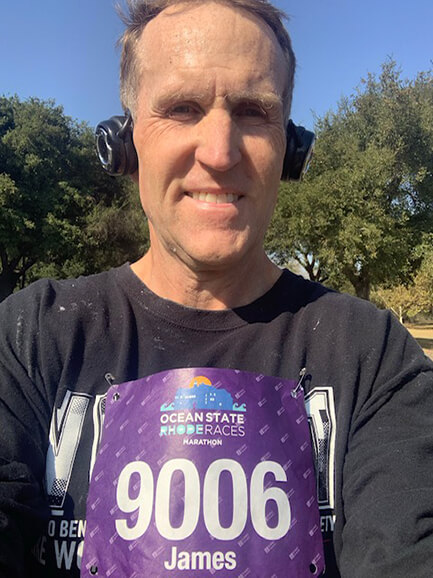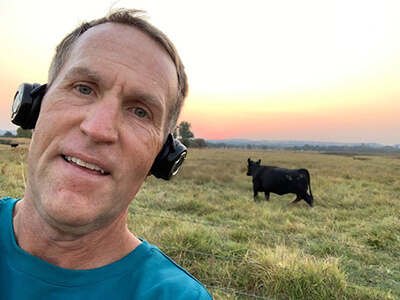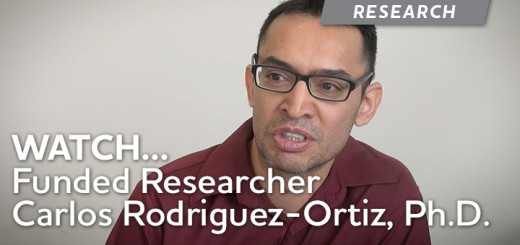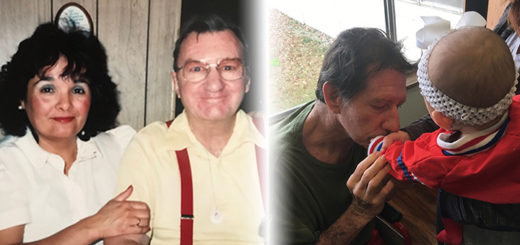Amador County marathoner living with rare dementia runs for The Longest Day®
While forced to retire early because of his primary progressive aphasia diagnosis, James hasn’t had to give up running, one of his favorite activities. In his hopes of helping researchers find a cure, James is using his love of running to raise funds for The Longest Day®.
The “Energizer bunny”
James was one of the top analysts for Forrester Research, a global market research company. He was recruited by Microsoft, only to return to Forrester a few years later. As one of the most influential tech analysts helping corporations and people understand how to use cloud computing, James travelled globally to meet with clients.
“He was a keynote speaker at major conferences all over the world,” James’ wife, Reesa, proudly shared. “His nickname at Forrester was ‘Energizer Bunny’ because he had endless energy and an endless capacity to help others.”
Outside of work, James loved playing sports, spending his time as a mentor and coach to others. For a short period of time James was a coach for other non-profits and later, James formed his own running team.
Forgetting his past
When James was 52 years old, he noticed that he was forgetting things from his past. “I was having memory problems,” said James. “I had no idea what was causing it and therefore no idea what would help me deal with it.”
James went to see a doctor. Because of his age, the doctor assumed it must be something related to James’ job. “He was having a hard time sleeping,” said Reesa. “They wondered if it was stress, anxiety, jet lag from constant travel or even a sleep disorder. They looked at everything and they didn’t have any answers.”
James and Reesa continued to reach out to various medical professionals to find a diagnosis that fit. Finally, James saw a neuropsychiatrist who suspected James had primary progressive aphasia (PPA).
Primary progressive aphasia
PPA is the second major form of frontotemporal degeneration (FTD) that affects language skills, speaking, writing and comprehension. PPA normally comes on in midlife, before age 65. FTD is a group of disorders caused by progressive nerve cell loss in the brain’s frontal lobes (the areas behind your forehead) or its temporal lobes (the regions behind your ears).
“James has challenges with word finding, knowing the meaning of words and understanding conversations,” said Reesa. “PPA is a specific and rare language disorder. He has a difficult time writing and reading, which were core functions of his job.”
James was forced to retire from his work a technology analyst. James said, “The doctors said to stop working right away, and I followed their advice.”
After the diagnosis, James and Reesa moved to Amador County to be closer to family.
Finding support
James and Reesa didn’t know much about PPA but they knew they needed to build a network of support. After some research on resources available in Sacramento, James and Reesa came across the Alzheimer’s Association®.
From there they learned about a younger-onset support group that is designed for people who were diagnosed with dementia under the age of 65. James said, “I care about getting help with my disease and meeting with other people who have it too.”
Because of COVID-19, in 2020 all of the Alzheimer’s Association support groups moved to a virtual platform. This allowed people like Reesa and James to have access to support groups that would have been too far for them to attend in person. Despite living in Amador County, James and Reesa were able to attend a support group that would normally meet in the Bay Area.
“When we found the younger-onset group, it made a difference,” said Reesa. “ We could all relate to one another because we were in the same place in our lives. James and I were at the height of our careers and professional success. We had to do a 180 in our life.”
James and Reesa have made friends with others in the group. They have been able to travel to the East Bay to meet up with them in person for hikes and barbeques. “It’s a great way to connect, especially during COVID-19” said Reesa.
Yes to clinical trials
James also participates in any clinical trial he can. Clinical trials are research studies conducted with human volunteers to determine whether treatments are safe and effective. Without clinical research and the help of participants, there can be no treatments, prevention or cure for Alzheimer’s disease.
“We say yes to everything,” said Reesa. “Any research, education or networking opportunity. We want to be known. We think it’s important to be seen and heard. If it helps future families that are faced with this, it’s worth it.”
Running goals
Now that he’s retired, James spends much of his time running. “I run four times a week,” said James. “I do frequent half marathons and try to run a full marathon once every three months.”
James started doing running fundraisers when he was in his 30s, by supporting a friend who was diagnosed with leukemia. Over the last twenty years, he has used his passion for running to raise funds and support causes that are important to him.
When James first began to run marathons, he set a goal of 50 marathons by the time he was 50. Having achieved that goal, he now aims to run a marathon in all 50 states. He has four left: Wyoming, Arkansas, Nebraska and North Dakota. This year, he will run two of the final four and donate the money he raises to the Alzheimer’s Association, as part of The Longest Day.
“I’m excited to run in all 50 states,” said James. “Since I was diagnosed with PPA, running has been so helpful for me. It makes my brain feel better and keeps it healthy.”
Raising funds
The Longest Day, one of the Alzheimer’s Association’s signature fundraising events, is the day with the most light — the summer solstice. On June 21, people from across the world will fight the darkness of Alzheimer’s through a fundraising activity of their choice.
Even though he will be fundraising for both out of state runs, neither of them will be held in June. Wanting to honor The Longest Day by participating in a marathon this June, he found one in Sacramento that is close to The Longest Day.
He will be asking friends, family and former coworkers to support him by asking for donations to his team. He has a large network on LinkedIn and uses that to encourage people to donate.
“Everyone thinks of this as an old person’s disease,” said Reesa. “No one thinks of young people who are at the height of their career: people who are thriving professionally and then everything comes to a grinding halt. It could happen to anyone.
“James is the healthiest person I know. We need to raise money for research and ways to target and help people, especially those with rare dementias like James.”
Love your brain
James encourages others living with dementia to get disease-specific speech therapy, join a support group and focus on the 10 ways to love your brain, especially exercise. “It doesn’t have to be running,” said James.
“It could be walking, biking or other things to help them feel strong. It keeps our brains healthy and that is so important for us to do.”
While the summer solstice is on June 21, you can raise funds for The Longest Day anytime. Start your fundraising today by visiting alz.org/thelongestday or make a donation on James’ page.
Interested in learning more about Alzheimer’s Association support groups? Visit our support group page or call our 24/7 Helpline at 800.272.3900.




















